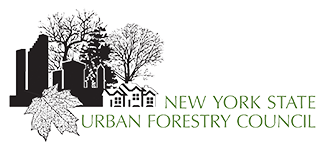Kathy Lawrence is the dynamic Board Chair for the Greater Newburgh Parks Conservancy. She received some financial assistance from the Council toward attending MFI. She shares this reflection from the training.
With advice and support from some amazing folks at the New York State Urban Forestry Council, NYSDEC/NY ReLeaf, and the Society of Municipal Arborists, I was able to participate in the 2021 Municipal Forestry Institute (MFI). For a golden week in late September, I joined 40 fellow learners in Bowling Green, Ohio for an intensive and inspiring leadership and professional development journey. Through pre-conference work and five very full days in person, eight instructors and a half dozen guest speakers worked with our group of city arborists, urban foresters, state and municipal urban forestry staff, landscape architects, consultants, and non-profit leaders and advocates.
A veteran of several leadership development processes, I was thoroughly impressed with the passion, dedication, and careful preparation of the teaching cohort. They were not only experts in urban forestry with a wide range of experience in the field but also well-versed and totally dedicated to Growing Leaders for Urban Forestry and to expanding the capacity of individuals and organizations across the country to build more successful community tree programs.
The four primary components of the MFI program were:
- Developing A Leadership Approach To Your Position
- Thinking and Planning Strategically to Advance Urban Forestry Efforts
- Working Effectively with Boards, Coalitions, and Non-Profit Organizations
- Managing the Relationship Between People and Trees
These were covered through a great combination of reference materials, presentations, slides, cartoons, videos, TED talks, problem-solving breakout sessions, role playing, and practical advice.
The most valuable part of the entire process for me was hearing in some detail the lived experience of folks, whether they were in settings similar to my own or quite different. It was particularly enlightening to learn in more depth about the trials and triumphs of arborists working at city or state levels, dealing with bureaucracies and both public interest and public misperceptions.
Aside from the professional relationships forged, I also deeply appreciated:
- The focus on creativity, visioning, and inclusion;
- Detailed tips and simulations (with and without notice!) on how best to deal with the media; and
- Guided opportunities to reflect on leadership styles and legacy planning.
A long-lasting take away for me in the Communications Leadership session was to constantly frame and return to the “why” of the work, whether at the level of Board development and staff development, organizational collaborations, volunteer and community engagement, or media relations. In each case, we can best enlist people’s interest, buy-in—and eventually, whole-hearted empowerment—to protect and expand our urban forests if we focus on such basic questions as:
- Why do we care?
- Why should we take action?
- What’s in it for me (or the people we seek to cultivate)?
A quote I keep referring back to is, “It’s not about the trees, it’s about what the trees do for us and what we do for the trees.”
One fabulous resource I learned about is the TreePeople’s 22 Benefits of Trees.
I also deeply appreciated the invitation to share a little bit about our Greater Newburgh Parks Conservancy collaborative Environmental Justice Fellowship program, and hearing from others across the country who are immersed in racial justice and equity around urban forestry.
I look forward to staying in touch with the MFI Class of 2021 learners and instructors and am grateful for the support from NYSUFC and Society of Municipal Arborists that allowed me to be a part of this growing network. 🌳





